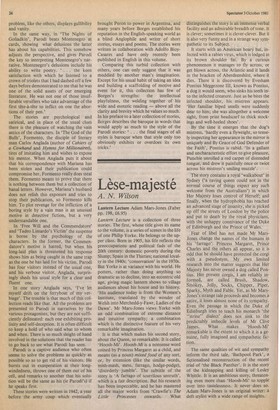Lese-maj este
A. N. Wilson
Lantern Lecture Adam Mars-Jones (Faber pp. 198, £6.95) Lantern Lecture is a collection of three stories. The first, whose title gives its name to the volume, is a series of scenes in the life of one Philip Yorke. He belongs to the upper class. Born in 1905, his life reflects the preoccupations and political fads of the 20th century: domestic poverty during the Slump; Spain in the Thirties; national loyalty in the 1940s; 'conservation' in the 1970s. But Yorke is at variance with his world. He potters, rather than doing anything so dramatic as to decline, into an eccentric old age, giving magic lantern shows to village audiences about his house and its history. 'His audience today is from the Women's Institute, translated by the wonder of Welsh into Merchedd-y-Fawr, Ladies of the Dawn'. Mr Mars-Jones views Yorke with an odd combination of extreme distance and intuitive sympathy; a combination which is the distinctive feature of his very remarkable imagination.
It is that which makes his second story, about the Queen, so remarkable. It is called 'Hoosh-Mi'. Hoosh-Mi is a nonsense word coined by Princess Margaret as a child, and means (as a noun) mixed food of any sort, or, by extension (like the similar words, mish-mash, mess, farrago, hodge-podge), 'disorderly jumble'. The subtitle of the story is 'A farrago of scurrilous untruth', which is a fair description. But his research has been impeccable, and he has mastered all the major works from 'Crawfie's The Little Princesses onwards. What distinguishes the story is an immense verbal facility and an admirable breadth of tone. It is clever; sometimes it is clever-clever. But it is also very funny and in a strange way sympathetic to its Subject.
It starts with an American hoary bat, infected with a rabies virus, which is lodged in its brown shoulder fat. By a curious phenomenon it manages to fly across, or get blown across, the Atlantic and it lands in the bracken of Aberdeenshire, where it dies. There it is discovered by Evesham Pontius Meggezone III, known as Pontius, a dog it would seem, who sinks his teeth into the infected creature. Just as he bites the infected shoulder, his mistress appears. 'Her familiar biped smells were suddenly dear to him; she was altogether a welcome sight, from print headscarf to thick stockings and well-heeled shoes'.
By the time it emerges that the dog's mistress, 'hardly even a flyweight, so tensely inspecting her appearance in the mirror is uniquely and By Grace of God Defender of the Faith', Pontius is rabid. 'In a gallant and uncharacteristic effort to give pleasure, Punchie unrolled a red carpet of distended tongue, and drew it painfully once or twice across his mistress's smiling muzzle'.
The story contains a royal 'walkabout' in Sydney Ca raving queen could not in the normal course of things expect any such welcome from the Australians') in which Her Majesty loses control of Herself; and finally, when the hydrophobia has reached an advanced stage of insanity, she is picked up off the streets of London by the police and put to death by the royal physicians, with the unhappy connivance of the Duke of Edinburgh and the Prince of Wales.
Fear of libel has not made Mr MarsJones change the names of the humans in his 'farrago': Princess Margaret, Prince Charles and the others all appear, so it is odd that he should have protected the corgi with a pseudonym. My own limited research into the matter suggests that Her Majesty has never owned a dog called Pontius. Her present corgis, I am reliably informed, are called Brush, Shadow, Smokey, Jolly, Socks, Chipper, Piper, Sparky, Myth and Fable. Yet, as Mr MarsJones's strange tale proceeds and becomes a satire, it loses almost none of its sympathy. Even the passage in which the Duke of Edinburgh tries to teach his monarch 'the "strine" dialect' does not sink to the predictably imbecile levels of Mr Clive James. What makes 'Hoosh-Mi' remarkable is the extent to which it is a genuine, fully imagined and sympathetic fiction.
The same qualities of wit and sympathy inform the third tale, `Bathpool Park', a fictionalised reconstruction of the recent trial of 'the Black Panther'. It is the story of the kidnapping and killing of Lesley Whittle. It is an ambitious story, threatening even more than 'Hoosh-Mi' to topple over into tastelessness. It never does so. Adam Mars-Jones is an original writer: a deft stylist with a wide range of insights.






































 Previous page
Previous page